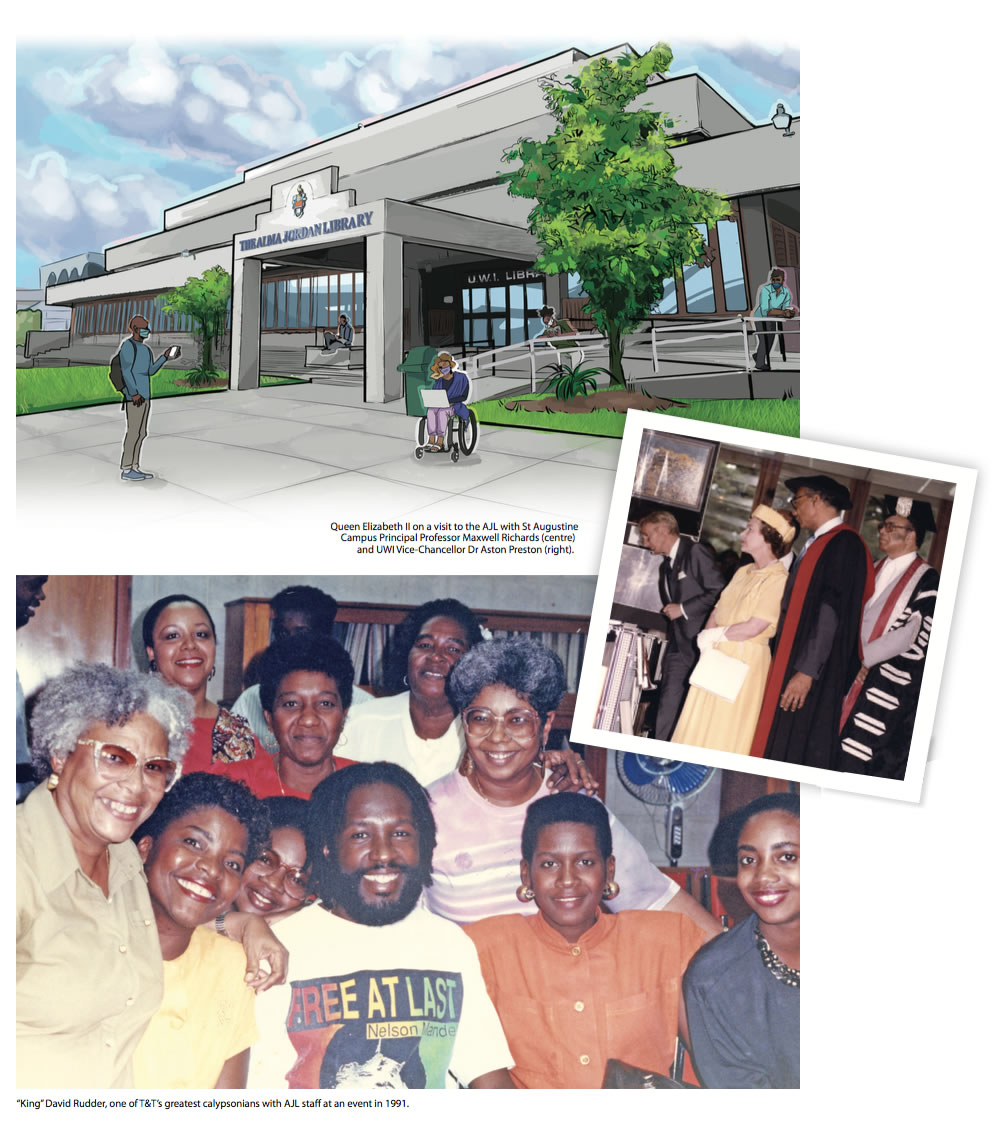
Fifty years ago, a building that would become one of the richest repositories of information in the region opened its doors for the first time. The Alma Jordan Library, on the southern side of UWI's St Augustine Campus, would become a haven for research and study. It has evolved to reflect the times and the needs of its users, while striving to maintain its tradition of excellence and service.
The serene seat of knowledge as it is known today had a controversial start. Paid for by the US government as part of negotiations to leave their military base in Chaguaramas, the edifice was initially to be named the JFK Library, after the late American president.
But the year was 1970. UWI students crying "black power" were driving a national movement for racial equality. They would not abide the naming of their new institution after an "imperialist" figurehead. The administration acquiesced: for years, the building would be known simply as the Main Library.
The label was apt. The library blossomed under the leadership of its first Campus Librarian, Dr Alma Jordan, who worked to develop the collections of books and audio visual resources and whose name it would eventually adopt. It would become the central library of not only the St Augustine Campus, but the others as well.
The network of libraries includes one at the Arthur Lok Jack Global School of Business, the Norman Girvan Library, the Medical Sciences Library, the School of Education Library, the Seismic Research Centre Library and the Patience Theunisses Memorial Library at Mt St Benedict.
The four-storey Alma Jordan building houses 400,000 books and is split into sections including Engineering, Food and Agriculture, Humanities and Education, Law, Science and Technology, Social Sciences, and West Indiana and Special Collections — the latter being a unique treasure house of Caribbean history.
It was his background in History that led to Dr Glenroy Taitt's recruitment to work in the West Indiana and Special Collections section in 1997. But he still remembers the first time he walked through the doors in 1977. It was the year before he started his undergraduate studies and, he recalls, "we form six students snuck into the library on a couple of evenings, because we had got word this was a valuable place to go and study. I was totally in awe of this huge building. I just could not believe it!"
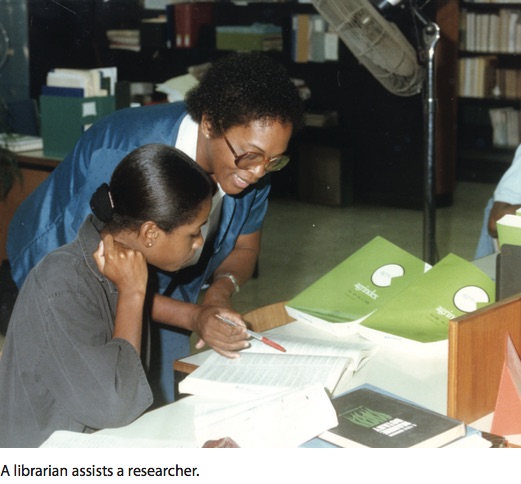
Years later, having lectured at the History Department at UWI from 1990 to 1991, and having earned a Doctorate in History from Sussex University in England in 1997, he took on a prestigious first assignment at West Indiana: cataloguing the newly acquired CLR James Collection, which contained the late chronicler's extensive personal library, letters, photos and manuscripts.
Located on the second floor, West Indiana is a jewel in the library's trove. Dr Taitt explains: "It is the section of the library that focuses on our region, largely the English- speaking Caribbean.
"It features many published and unpublished documents and primary, raw source materials — original items that researchers want to dig into. There are rare books and archival materials, journals, magazines, newspapers, and many historical papers published in the region or about the region."
These resources are preserved using archival folders, envelopes and boxes. Access is carefully regulated.
Dr Taitt notes that because UWI is funded by regional governments — and therefore taxpayers — "the library, through West Indiana, has a responsibility to society".
Former Campus Librarian Jennifer Joseph notes that the West Indiana Collection is being digitised. The shift towards electronic library services has been ongoing. "I look back now at the strides we made in modernising services," she says.
After working at libraries in the private and public sector, in multinational organisations like the World Bank and at the International Monetary Fund (IMF), and the Ministry of Finance in Trinidad, she was somewhat surprised at the slow pace of technological advancement at UWI's library systems when she joined in 1998. She had to share a desktop computer with another member of staff.
"At that time, the special libraries in the public service were ahead of UWI in terms of providing electronic services and had started digitising their inventory," she says.
But by 2000, things were changing. The library management lobbied the Bursary, stressing the importance of investing in online resources.
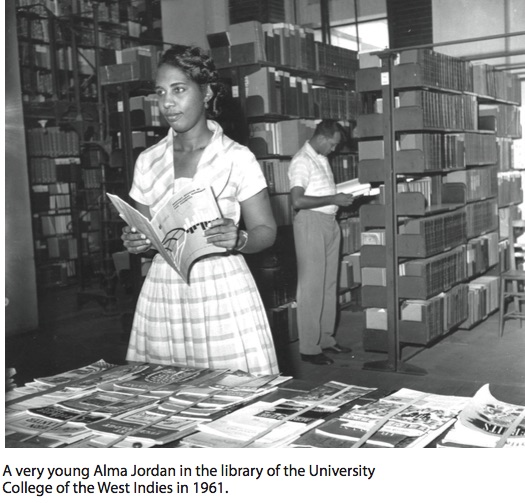
"These resources allowed us to consolidate the excellence in service that Alma Jordan was known for. We built on the service, establishing policies and providing the much-needed equipment. Now we can give even more efficient, personal, detailed support. You can access information anywhere, anytime," she explains.
In her role as University Librarian, she worked closely with the other UWI campus librarians at Mona, Cave Hill, and the Open Campus seeking to streamline and modernise the institution and to fulfil the goal of "one university". It was at this time that UWILinC was established. UWILinC is an e-Information portal which allows users to search for information in the libraries across the region through a single interface.
She says she had good rapport with staff of all the campus libraries, "because we all wanted the same thing".
Joseph sees the library staff as a family, and she is keen to credit the contributions of her predecessors, former Campus Librarians Professor Margaret Rouse-Jones and the woman she calls "the mother of the library", Alma Jordan herself.
It was Joseph that suggested the building be named in her honour, in 2011: "I felt we needed to recognise her. She is a formidable lady — the inveterate professional."
Joseph too, values professionalism: "I am old fashioned. I think staff should dress properly — you can't look like the students! If a user walks in they should be able to identify staff."
Her term saw the introduction of monogrammed polo shirts for personnel, and even monogrammed blazers for formal occasions — or long hours in the library's "freezing" halls.
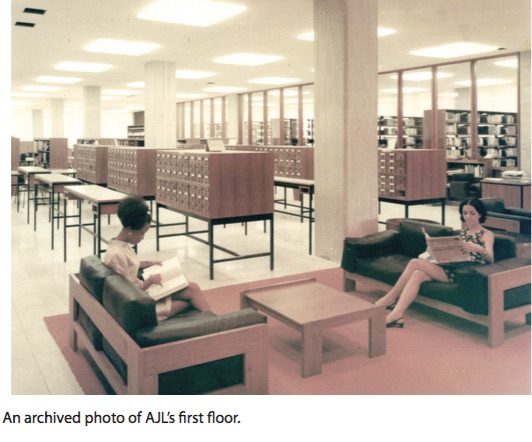
From childhood, Joseph wanted to be a librarian. She went to UWI Mona in 1975 to study for a post-graduate diploma in Library Studies, then to Columbia University in 1984, earning her Masters of Science in Library and Information Studies.
"Sharing information and helping people find information has always been rewarding," she says.
Current Campus Librarian Frank Soodeen succeeded Joseph in 2015. He recently started his second five-year term, and sees his role as building on the work of his "illustrious predecessors," and "the management and staff who have served the institution over the years".
He says he is "driven by the need to support our students, faculty and major stakeholders".
Soodeen started in the library's IT Services Division, and as director he has "focused on transforming it from dealing with books and analogue content, to the point where we are now."
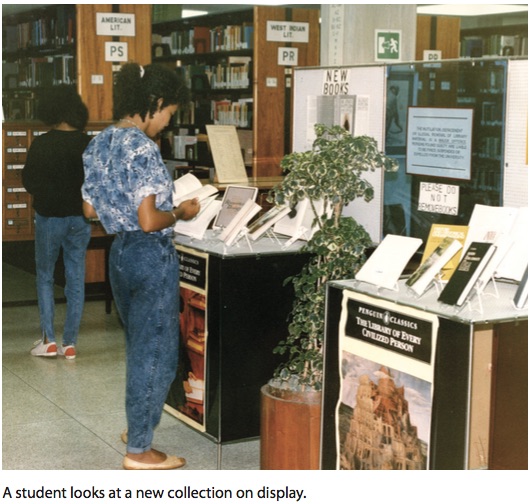
He believes "you have to know your audience and understand what their needs are", but adds, "those needs, as well as their information seeking behaviours, have been changing fairly quickly over the years. Our responsibility as a library is to ensure that our services and delivery of information products keep in sync with those changing needs."
Soodeen sees the library as an extension of the classroom and as central in fostering the academic success of the students and staff.
"We are really an online environment now for the most part, with a number of electronic resources," he adds.
One of the platforms Soodeen is most proud of creating is the UWISpace institutional repository, developed to capture the intellectual output of the university.
"When I started as a librarian in 1999, I realised many students didn't know a lot about digital literacy, including the basics like how to save a file to a directory or how to search the internet," he says.
Importantly, many did not understand how to discern reputable sources from questionable ones, a crucial skill when doing research.
He remembers spending many lunch hours during his first year teaching users to use the programmes and apps.
Soodeen says, "over the last 15 to 20 years, [students] are much better versed in dealing with computers and technology. Now, it seems that a lot of our children are born with a computer chip in their heads! So it's also critical for our faculty to know how to use the programmes and applications involved in delivering teaching in this current environment. It's an entirely different type of pedagogy, adjusting to which can sometimes pose a challenge both to the lecturer and the student."
Looking towards the future of AJL and libraries in general, he points out that it "has to be built around strengthening the network of university libraries across the region. There has to be a thrust toward globalisation and online learning."
He says: "Because of COVID-19, we are going to be online for a very long while." He feels even after this initial stage, "we will probably continue with a hybrid, blended approach. The UWI libraries have a big role to play in supporting and growing this online learning and teaching environment. Our libraries must move in this direction — it cannot be business as usual."
Frankly, students prefer online learning. What is frustrating for them in the Caribbean is infrastructure that doesn't support it — the slow rate of internet penetration, freezing screens, low bandwidth, etc, particularly in underserved communities."
He adds, "it's challenging for a lot of people, but AJL is committed to helping guide the process along. We have to use Caribbean content to develop digital learning, stop relying on foreign texts, and push for publication in the region. Our libraries must move in this direction — it cannot be business as usual."
AJL's 50th Anniversary celebrations have included a display on the 50th anniversary of the Black Power Movement in March, a festive staff luncheon in January, a treasure hunt, a student essay-writing contest, and an exhibition of works by artist Donald "Jackie" Hinkson (who also donated more than 70 books of his original artwork and sketches to the West Indiana and Special Collections Division).